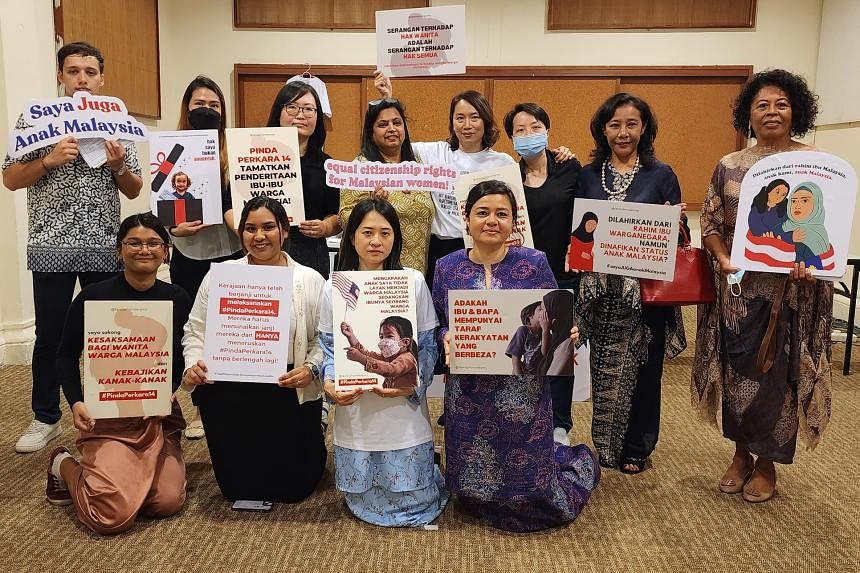KUALA LUMPUR – Changes to Malaysia’s citizenship law proposed by Prime Minister Anwar Ibrahim’s administration have been described as “cruel” by critics, and has raised fears that the amendments could create a new class of stateless persons including children.
One amendment would automatically grant citizenship to children born overseas to Malaysian mothers who are married to foreigners.
However, other changes proposed are causing a stir among critics who say citizenship rights would be removed for other groups.
There are five other proposed amendments to Schedule 2 of the Federal Constitution that they say would create a large pool of stateless children. Under one such amendment, abandoned babies and children will no longer be entitled to automatic citizenship, according to the opponents, who call the move “regressive”.
“This is a cruel amendment. They will strip away the rights to citizenship of the stateless. Why are we punishing the children?” said Mr Zaid Malek, director of non-governmental organisation (NGO) Lawyers for Liberty.
“They are sealing the fate (of these people),” he told The Straits Times on Tuesday. “The stateless are already deprived of their rights to education and healthcare. They will be forever stuck in Malaysia and unable to do anything.”
Several NGOs gathered on Tuesday to criticise the proposed changes. They said they will submit a memorandum to ask for a review from the Conference of Rulers and the Cabinet. The groups include Lawyers for Liberty, Family Frontiers and Yayasan Chow Kit.
Several MPs from the ruling Pakatan Harapan coalition have said they will not back the constitutional changes, which would require a two-thirds support in Parliament to pass.
Datuk Seri Anwar’s unity government currently has the support of 151 MPs, including four from the opposition. This is a narrow three-vote majority over the minimum number of votes required for two-thirds support.
There were some 150,000 applications for citizenship as at end-August 2023. If the amendments are passed, many of these applicants may no longer be able to apply for citizenship.
Among the categories of stateless people in Malaysia are children born out of wedlock to a Malaysian father, stateless children adopted by Malaysian parents, abandoned children without documents to prove their nationalities, and families with generations of stateless children born in Malaysia.
Under the current Constitution, they are automatically granted Malaysian citizenship, although rights activists say that in reality, the application process for such groups is fraught with bureaucratic delays and appeals, and takes many years with no guarantee of success.
There is also a proposal for the age limit for registration to be lowered to 18 years from 21 years, potentially narrowing the pathway for stateless children to gain nationality.
Queries to the law and home ministries had not elicited a reply to why the government, in a bid to resolve the issue of overseas-born children, has decided to also make amendments to other sections of the Constitution, say rights activists.
They note that stateless children in Malaysia do not possess identity cards or passports, and are deprived of their right to attend public schools.
According to the activists, access to tertiary education for the stateless has also been suspended as of 2023.
In addition, stateless children are denied free medical care, and as adults, face difficulties in finding jobs, without proper qualifications.
Ms Melissa Quek Ai Ying, 21, who is stateless but has a birth certificate, was born to a Malaysian father and an Indonesian mother, before her father’s divorce with his first wife had been finalised.
Ms Quek was denied an identity card (IC) at the age of 12 and had to drop out of school as she could not take exams without an IC. She had to work illegally to make ends meet, such as selling flowers, nasi lemak and ice-cream by the roadside.
She is now working as an actress and sometimes offers manicure services at clients’ homes.
“The police always ask me a lot of questions, such as where is your identity card. I lie sometimes, but at the end of the day, I am honest and tell them everything. Some understand and some don’t,” she told ST.
On the positive side, the proposed amendments will resolve the issue of citizenship for children born to Malaysian mothers overseas.
Between 2018 to end-January 2023, a total of 3,443 applications for citizenship were received from parents of overseas-born children with Malaysian mothers.
The planned changes form part of a long-held election promise by Mr Anwar, as well as his ally Barisan Nasional, and are widely seen as a move towards gender equality regarding citizenship for children.
Currently, only children born overseas to Malaysian fathers are automatically granted citizenship. For years, Malaysian mothers with non-Malaysian spouses whose children are born overseas have to apply to get citizenship for their children, with a low approval rate of below 2 per cent.
Mr Anwar said on Monday that the government will explain the proposed amendments to its backbenchers, adding that the Conference of Rulers had discussed the proposals.
“Any constitutional amendment that affects the issue of citizenship has to be cleared with the Conference of Rulers,” he told reporters.
“The rulers have taken a certain position, and we will have to, therefore, honour that.” However, he did not state the position taken by the Conference of Rulers.


